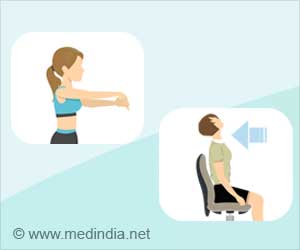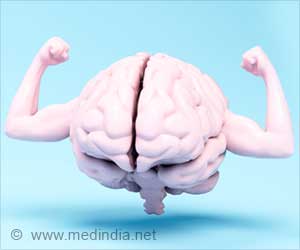The human body has its own rhythm called the circadian rhythm or biological clock and this controls our sleep and wakefulness. The clock works according to our exposure to light, genetic makeup and sleep patterns. Early morning light can reset our clocks. In an experiment it has been seen that if we put a person in a cave without any device or stimuli, it is found that on average, each day the person goes to bed about one hour later and wakes up one hour later than normal and this is due to an internal time keeping mechanism with a period of about 25 hours.
The pineal gland in the brain maybe responsible along with Suprachiasmatic Nucleus(SCN) in controlling our clocks of the body. If SCN is destroyed there is loss of 24 hour rhythm of sleep/wake cycles.New brain research now shows that brain too has its own rhythm. Akin to circadian rhythm, brain energy waxes and vains vary with time of the day. The brain rhythm depends on the levels of various hormones and follows to some extent the clock of the body. The way in which we can enhance the brain power is by orchestrating the circadian rhythm, brain rhythm and day hours to each other. By synchronizing these rhythm and timings together, life can be more efficient, productive and energized.
Here’s your daily guide to learn on how to sync up to your brain’s power hours.
4AM to 9 AM – Passion Time
Rockefeller University’s neuroscientist, Ilia Karatsoreos, PhD says that "The perfect moment for bonding with your spouse is right when you wake up”. This is because the oxytocin (love hormone) levels are sky-rocketing in morning hours, thus making it a perfect rendezvous to bond with all your emotionally significant partners or loved ones. This is more true for men, whose oxytocin levels were found to be high in morning hours irrespective of their age. Use this precious hour by indulging in –
• Making love or giving that special cuddle
• Or Pen down a ‘Thank You’ note or ‘I love you’ note to your loved ones and see your emotions flow
According to International Brain Education Association’s secretary, Sung Lee, MD, the brain now has moderate levels of cortisol - a stress hormone. As per University of Michigan study, brain sharpness declines in afternoon, irrespective of the age. Thus, you can best utilize these hours by taking on taking on tasks which require concentration and analysis like-
• Developing new ideas or brainstorming on a particular issue
• Schedule discussions/meetings in your office on significant matters
• Discuss any personal/family matters
11 AM to 2 PM – Challenging Tasks Time or Action Time
During this time of the day there is sharp decline of sleep hormone melatonin. This signifies that you are now ready to take on the load of projects or in other words, it is action time due to mental alertness and quickness. German researchers found that the reaction time and ability to complete several to-dos were strong in middle of the day. Use this time for -
• Rip through your to-do list
• Give presentation to a client or boss
• Tackling the errand list, voice mails or e-mails
There is one warning though: Zip through you problems or to-dos one by one. Rene Marios, PhD, an associate professor of Psychology and Neuroscience at Vanderbilt University, says that attempts to juggle tasks put additional demands on your brain, so cross off the to-do list one by one.
2 PM. to 3 PM – Break or Lunch Time
As indicated by a recent Harvard study, it is healthier to eat lunch around 2 p.m. as body’s circadian rhythm is in a brief down phase during this hour of the day. Therefore, it is the best time to take a break from various chores. Tap this hour’s potential by:
• Take a power nap: a 15 minute nap can fight off your post-lunch drowsiness.
• To clear off the drowsiness: take a drink of water or a quick walk or brisk stroll around a block
• Tap into recreational exercises like reading a magazine or surfing a website or meditating
• Refresh yourself by doing micro-exercises like round movement of shoulders or arms or neck. This would relax the strain-prone muscles of body
3 PM. to 6 PM – Collaboration Time
• Paul Nussbaum, PhD, adjunct associate professor of Neurological Surgery at University of Pittsburg School of Medicine and author of “Your Brain Health Lifestyle”, adds that by now the brain is pretty fatigued, yet it doesn’t mean that you are stressed. So easy-going discussions, or other activities are perfect for these hours. Use this hours of the day by
• Brainstorm with co-workers or plan a low-pressure meeting
• Strength training or a Gym session is advisable as evening time is best for manual dexterity, grip strength, and other physical skills.
6 PM. to 8 PM – Personal tasks Time
This is the time when brain enters the ‘wake maintenance’ phase where the sleep-friendly hormone, melatonin reaches a dip and alerts the body. Thus, making perfect timing to rejuvenate the mood, health and mental energy. Halt briefly to view the sunset: The soft sunlight prepares your body for the night and produces the next day’s serotonin or ‘feel good’ hormone. You are in a phase of renewed energy which can be directed in any course. Studies show that taste buds lit up during these hours because of the circadian variations in hormone levels. These hours can be optimally utilized by -
• Cooking a delicious meal
• Rendezvous with friends / relatives or partying with them
• Enjoying quality time with family
8 PM to 10 PM. – Relaxation Time
British and Australian researchers report that during these hours there is abrupt rise in melatonin, preparing us to sleep. This is the time to ease out, relax and indulge in ‘mindless activities’ as by now the brain is tired.
• Unwind by watching a funny movie or a television show
• Try a low-key, repetitive activity like knitting
• Or just do nothing!!
10 PM. Onwards – Snooze Time or Recharge your system
Because the brain is tired, it needs to be re-energized. Also it is seeking out to interlace all that has been learnt in the spent day. Both tasks are accomplished through sleep. You can get an insight or strengthen your memory by sleep. Thus making it essential that you get the shut-eye 7 to 8 of hours sleep for optimal health and energy. Sign off early to sleep and maintain a consistent routine for better sleep. For better snooze time:
• Write in a journal
• Drift off reading something you want to remember in morning
• Listen to soft, slow music to aid sleep or guided meditation for sleep
• Practice gratitude by Thanking God for another day in life for a peaceful night’s sleep
References:
Reistad-Long, S. Get in Synch with your brain’s power hours [Internet] 2008 [Updated 2008 May 20; cited 2010 Dec 18] Available from http://www.msnbc.msn.com/id/24650466/ns/health-mental_health/
Reistad-Long, S. Your Brain’s Power Hours [Internet] 2010 [cited 2010 Dec 17]. Available from http://health.yahoo.net/rodale/PVN/your-brain-s-power-hours
Source-Medindia












